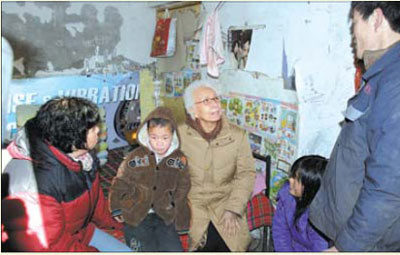Two years ago, Wang Xingjuan, an expert on women issues in her late 70s, read a news story saying that migrant groups occupy about 23 percent of Beijing's total population of 15.38 million. Migrant parents gave birth to 56,000 babies in 2005, which was six times more than it had been a decade ago.
"A foreign counseling institution estimates that half of China's city residents will be rural immigrants by 2020. A population of new citizens is surprising," says Wang. She founded the Maple Women's Psychological Counseling Center 20 years ago.
She notes that society pays a lot of attention to migrant children today. The priorities are whether they have a school and whether they will be trained to get a job in the city. However, a picture is missing here: Family education.
"Parents' love is indispensable and key to the cultivation of a child's personality. Yet our survey of migrant family relationships shows a lot of parents mistakenly equal their children's needs to just food and clothes, while turning a deaf ear to their spiritual thirst," Wang says.
Parents care a lot about their children's academic scores but are often absent from parents' meetings, she adds. Many of them don't know how to strike up a heart-to-heart conversation with their children and when they make mistakes they suffer discrimination from urbanites and feel insecure in their new place.
"Their top three criticisms are: no time, no intelligence and no approach," she says.
|

|
|
Wang Xingjuan (center) and Zhang Chensheng (left), from the Beijing Maple Women's Psychological Counseling Center, visit 9-year-old Xing Yuhui's family in Beijing to give family education advice. [China Daily] |
Wang has compiled a Migrant Family Education Manual and has distributed it to parents involved in her project. In the book she promotes the idea of "three 10 minutes", which involves 10 minutes of exchanging love between parent and child, another 10 minutes of educating ethnics, and a final 10 minutes of knowledge learning.
"The study of love is above everything. We can see behind the increase of crimes committed by migrant adolescents a lack of education and love from their parents," she says.
Advisors like Zhang Chensheng tell parents not to be shy about showing love to children. For instance, they encourage family members to hug.
"Some parents feel it is inappropriate to touch children once they enter puberty. They looked ashamed at first, but after the hugging, I saw tears of joy in their eyes," Zhang says.
They also encourage parents to keep notes about how they implement the "three 10 minutes" every day.
In the dairy of Ke Weibo, a first-grader of the First New Citizen Migrant School, his mother wrote in the section of "exchange of love" on April 15 that the father taught the son to chop and cook vegetables. The son was happy with cooking and ate vegetables, which he was fussy about, for lunch. She went on in "knowledge learning" that the father punished the son because he wasn't committed to his homework. Both of them were angry with each other. A comment from the family education advisor suggests parents and children agree with rewards and punishments beforehand.
(China Daily December 17, 2008)